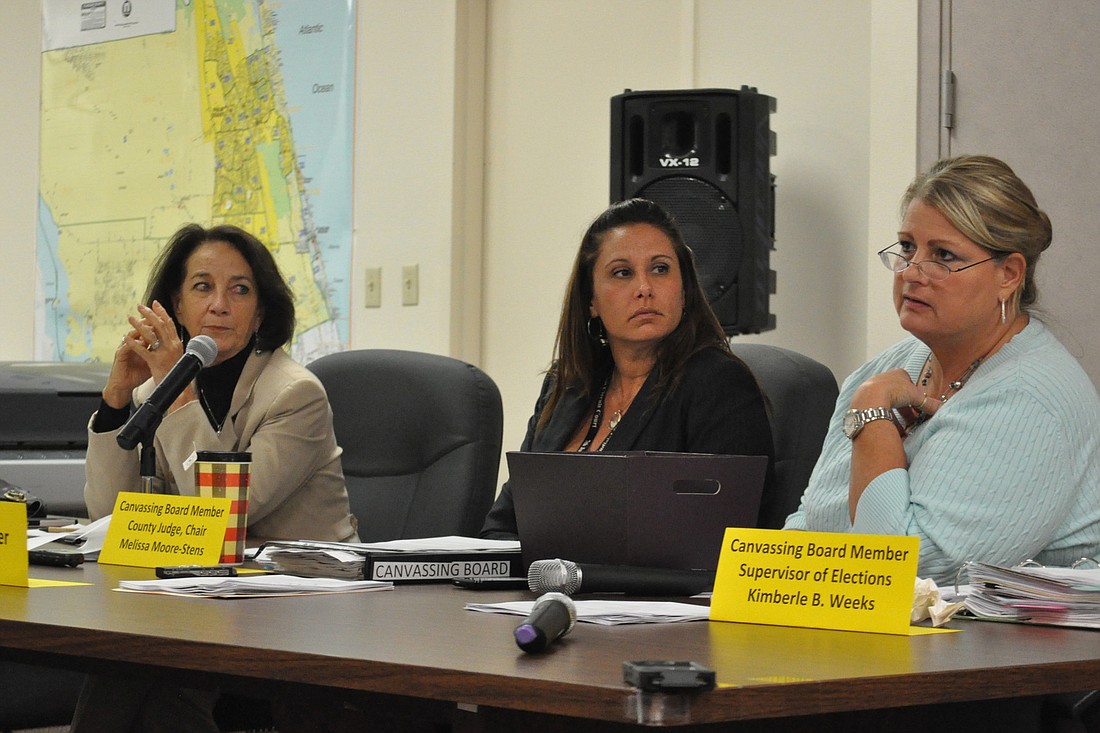- November 17, 2024
-
-
Loading

Loading

County Attorney Al Hadeed has called a Florida Bar complaint against him initiated by former elections supervisor Kimberle Weeks “an across the board attack” on his actions as county and canvassing board attorney, saying a key part of it is based on an altered audio-recorded conversation.
Weeks filed the bar complaint against Hadeed Dec. 17. She had also filed a number of official complaints against county commissioners, in concert with former County Commission candidate Mark Richter, before resigning from her post Jan. 5. She was then under investigation by the Florida Department of Law Enforcement, and that investigation is still underway, an FDLE spokeswoman confirmed Feb. 20.
In Hadeed’s formal response, sent to the Florida Bar Feb. 9 and released to the public through the county’s communications office Feb. 23, Hadeed said “official records demonstrate that the alleged facts are misstated and mischaracterized and that material facts are omitted’ in Weeks’ complaint, part of which centers around a conversation between Hadeed and County Commissioner Charlie Ericksen that Weeks recorded without either man’s knowledge last year.
Hadeed’s response, according to a county news release, noted that “the secretly recorded audio tape by Weeks had significant portions of discussions erased, including parts that were embarrassing to her. The effect of the deletions placed commissioners and Hadeed in a false light.”
The recording of the conversation between Hadeed and Ericksen was ostensibly part of Weeks' recording of a Canvassing Board meeting. She'd told the board she would not be recording the meetings, but then decided to do so, using her iPhone, without notifying other board members.
On Aug. 25, the Canvassing Board meeting convened in a room in the elections office, then moved to the adjacent room to tabulate ballots while Hadeed stayed behind in the first room. Ericksen walked in. Weeks had left her iPhone, turned on, in the room where Hadeed was; it recorded the men’s conversation. In a transcript of the recording in both Weeks’ complaint and Hadeed’s response, Hadeed tells Ericksen he’d once seen a “former, former county commissioner” reading ballots, and told him to stop. Weeks complaint called that conversation innapropriate and accused Hadeed of covering for the former commissioner. Hadeed said in his response that he’d notified the then-elections supervisor of the issue.
But the copy of the recording provided to Hadeed and others omits the beginning of his conversation with Ericksen, Hadeed said. The two men were discussing ballot secrecy, Hadeed said, because Weeks had just angrily barred FlaglerLive.com editor Pierre Tristam from the ballot tabulating room in a scene Hadeed described in his response as “the most tension filled event experienced by the Respondent up to that time in the election process.” Weeks “became physical in her blocking and was noticeably flush with anger. ... The action as extreme enough that Respondent was pondering some forms of intervention if he situation deteriorated." At one point, responding to Tristam's request that Weeks cite a legal justification for barring him from the public meeting, "she yelled into his face, 'It's my law,'" Hadeed wrote.
That altercation, along with Ericksen and Hadeed’s initial discussion of it, was not on the audio tape, Hadeed said, and he was therefore not able to include a transcript of the beginning of his conversation with Ericksen in his response to Weeks’ bar complaint. But, Hadeed wrote, in his conversation with Ericksen, he “was using this prior incident to stress the importance of the secrecy of the ballot.”
There were other complaints in the document Weeks sent to the bar: that Hadeed had not advised two county commissioners to step down for perceived missteps; that he exerted too much influence on the board. Hadeed noted that one of the two commissioners Weeks referred to hasd resigned on his own; and the perceived error of the other did not violate statee statue or require him to step down. As to Hadeed’s advice to the Canvassing Board, he wrote, he “provided legal advice in good faith and for which he researched as issues arose during the process,” and “did not impose himself on the Board, substitute his judgment for the Board, or overstep his bounds as legal counsel.”
Hadeed said he’d decided to release the document publicly after Weeks filed a response to his response to her initial complaint.
“I chose to counter each of her allegations individually,” Hadeed said in the news release. “This response would ordinarily be private until a decision by the Bar, but I have the option to make the information public.”
Hadeed said in an interview that the Florida Bar has a staff of attorneys who will review all of the relevant documents, perhaps do some independent work, then decide whether to refer to matter to a grievance committee for further review.
He has not been disciplined by the Florida Bar in the past, according to bar records.
To view Hadeed’s response to Weeks’ complaint, click here. To view Weeks' initial complaint, click here. To view Weeks’ response to Hadeed’s response, click here.